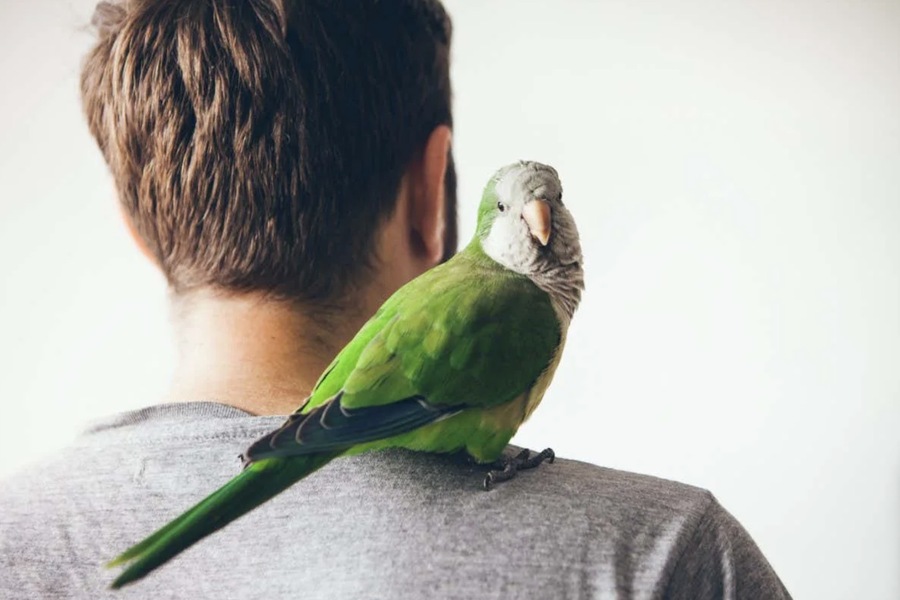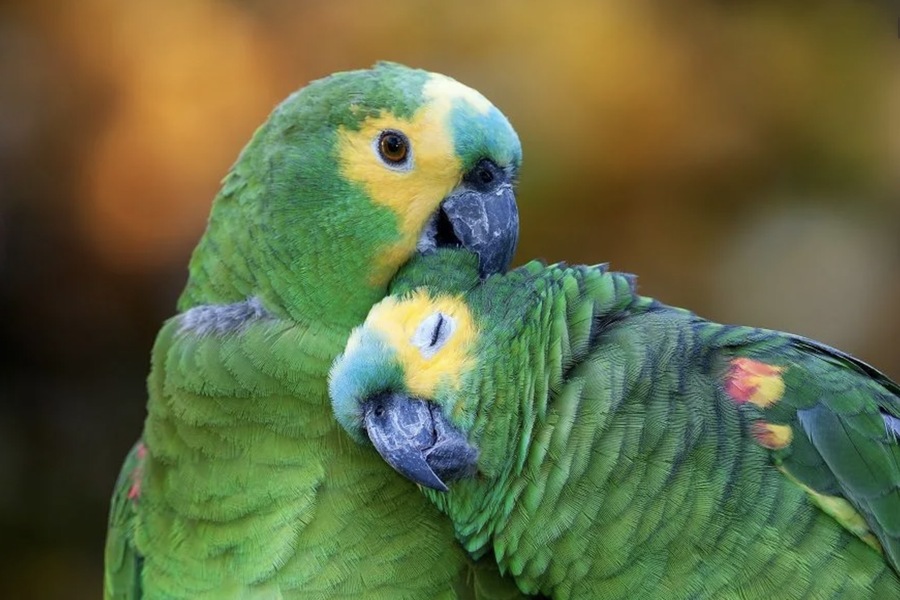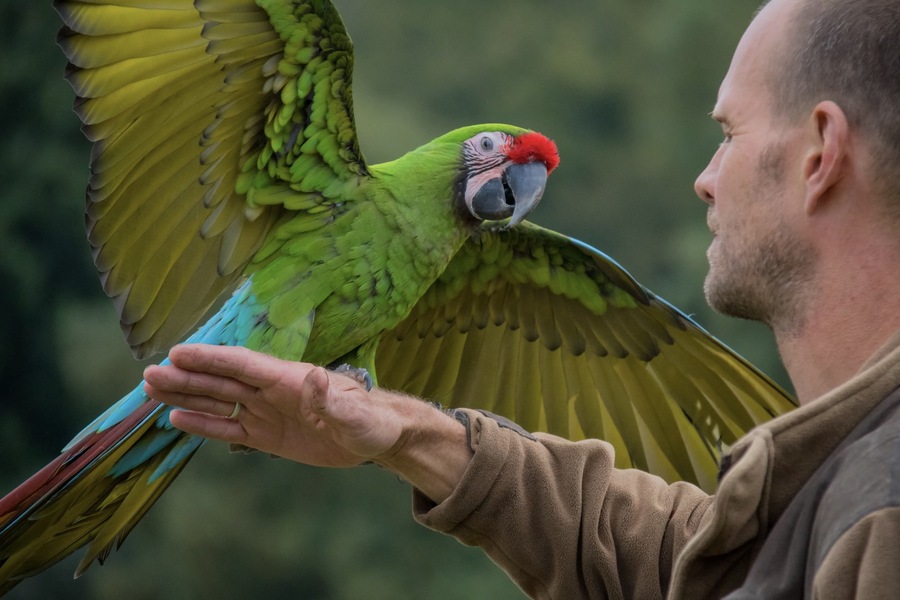Parrots are highly social animals that rely on grooming as part of their natural behavior, not only for cleanliness but also as a means of bonding and communication. Regular grooming supports their health by maintaining feather condition, beak and nail care, and skin cleanliness. However, grooming also plays a significant role in building trust between parrots and their caregivers. For parrot owners in Dubai and the UAE, where hot and dry conditions can add challenges to parrot care, grooming becomes even more essential. This article explores how consistent grooming promotes health and socialization in parrots, supporting positive interaction and a stronger bond with their caregivers.
Understanding the Role of Grooming in Parrot Behavior
Grooming is a natural activity for parrots, one they perform on themselves and others in their social group. This behavior, known as preening, involves aligning feathers, cleaning, and removing debris. Preening is essential for feather health, which plays a key role in a parrot’s insulation, flight, and appearance. In the wild, parrots groom each other as a form of bonding, and this instinct transfers to their relationships with humans. When parrot owners assist with grooming, it mimics natural social behaviors, building trust and encouraging a positive connection. Understanding grooming’s role in parrot behavior is fundamental to appreciating its impact on socialization.
The Health Benefits of Regular Grooming for Parrots
Beyond socialization, grooming has several health benefits essential to a parrot’s well-being. Regular grooming helps maintain feather alignment and cleanliness, which are important for temperature regulation, especially in Dubai’s hot climate. Grooming also ensures nails and beaks are kept at a comfortable length, preventing overgrowth that can cause discomfort or health complications. Moreover, grooming sessions allow caregivers to inspect their parrots for early signs of health issues, such as skin dryness, mites, or feather damage. By addressing these needs, parrot owners help their pets stay comfortable and healthy, laying the foundation for stronger social interaction.
Building Trust Through Gentle Handling and Grooming
One of the key benefits of grooming is the opportunity it provides for gentle handling, which is essential in building trust with parrots. Parrots can be sensitive to touch, and regular grooming sessions help them become accustomed to handling. This repeated contact, when done gently and respectfully, helps parrots feel secure in their environment and more comfortable around their caregivers. As trust builds, parrots may become more receptive to interaction, reducing fear-based responses. For caregivers in Dubai, establishing a regular grooming routine in a quiet, climate-controlled setting is crucial to creating a calm experience, fostering a sense of security that supports healthy social behavior.

Grooming Techniques to Encourage Positive Interaction
Effective grooming techniques can enhance the social benefits of grooming. When grooming parrots, caregivers should use calm tones and slow, gentle movements. Beginning with basic tasks like misting or light feather inspection allows the parrot to get used to the process. Using tools specifically designed for parrots, such as safe grooming scissors and nail clippers, reduces the risk of discomfort and builds a positive association with grooming. Including routine grooming as part of a daily schedule can also support interaction, as the parrot learns to anticipate the activity. These techniques encourage acceptance and cooperation, creating a shared experience that strengthens the bond.
The Importance of Social Grooming for Parrots’ Emotional Health
Social grooming, an activity parrots engage in with other flock members in the wild, has a profound impact on their emotional health. It reinforces bonds, reduces stress, and establishes a sense of belonging. When caregivers groom their parrots, it mimics social grooming behavior, which can help alleviate loneliness in single birds. Regular grooming offers companionship and fulfills an essential social need for parrots, fostering a positive state of mind. By engaging in social grooming, caregivers help meet their parrot’s emotional needs, contributing to a more balanced and contented pet.
Preventing Negative Behaviors Through Regular Grooming
Parrots that experience discomfort or stress from grooming neglect may develop negative behaviors such as feather plucking, excessive scratching, or aggression. These behaviors often stem from boredom, loneliness, or physical discomfort. Regular grooming helps prevent these issues by maintaining physical comfort and providing a consistent source of interaction. Grooming sessions offer mental engagement, giving parrots a sense of attention and care. When birds feel comfortable and engaged, they are less likely to resort to destructive behaviors, leading to a healthier and more harmonious relationship with their caregivers.
Adjusting Grooming Practices for Dubai’s Climate
Dubai’s hot climate can pose unique challenges for parrot grooming, as low humidity and high temperatures may cause dry skin and brittle feathers. To adapt to these conditions, parrot owners should incorporate misting into their grooming routine, which provides necessary moisture to the skin and feathers. Misting not only cools the parrot but also helps support feather integrity. For indoor parrots, maintaining proper air quality through humidifiers can further aid in moisture retention. This climate-adjusted approach to grooming is essential in the UAE, ensuring that parrots remain comfortable and responsive to interaction despite environmental challenges.
Creating a Safe Grooming Space
A quiet, controlled space is vital for grooming parrots, as a calm environment reduces stress and promotes cooperation. Parrots can be sensitive to sudden noises or movements, so setting up a designated grooming area that is free from distractions can make the experience more positive. In Dubai, where high temperatures may limit outdoor access, an indoor space with consistent temperature and humidity is ideal. Using a soft towel to gently hold the parrot during grooming also provides a sense of security. A well-prepared space helps minimize resistance and enhances the quality of interaction, making grooming an opportunity for bonding.
Parrot Grooming and Positive Reinforcement
Positive reinforcement is a powerful tool for making grooming a rewarding experience. By offering treats, verbal praise, or gentle head scratches after a grooming session, caregivers reinforce positive behavior. Parrots quickly associate grooming with these rewards, leading to greater cooperation over time. Positive reinforcement supports healthy socialization, as parrots begin to view grooming as a positive interaction rather than a task to avoid. For parrot owners in Dubai and the UAE, where the indoor environment may create added challenges, using positive reinforcement consistently helps ensure that grooming remains a smooth and mutually beneficial experience.

The Role of Professional Grooming Services in Socialization
For parrots that may require specialized grooming, professional services can provide valuable support. Facilities like Petlove in Dubai offer professional grooming tailored to parrots, ensuring safe handling and proper technique. Experienced groomers are skilled in managing parrots with unique temperaments, fostering a positive grooming experience that can carry over into home interactions. Professional grooming also provides additional socialization opportunities, as parrots become accustomed to different people and settings. These services, combined with at-home grooming, promote a well-rounded approach to socialization, benefiting parrots’ adaptability and willingness to engage with their caregivers.
Monitoring Parrot Behavior for Grooming Readiness
Parrots have distinct personalities and may display signs that indicate they are ready for grooming or need a break. Recognizing these cues—such as relaxed posture, calm vocalizations, or willingness to be handled—allows caregivers to proceed with grooming at an appropriate pace. If a parrot shows signs of stress, such as squawking, flapping, or retreating, it may be best to pause and attempt grooming later. Monitoring behavior helps ensure that grooming sessions remain positive and that parrots stay receptive to interaction. This responsive approach is especially important for maintaining trust and socialization in long-term care.
Long-Term Benefits of Consistent Grooming
Establishing a regular grooming routine provides lasting benefits for both physical and social health. Parrots that experience consistent grooming from a young age or early in their adoption are more likely to develop trust and cooperative behavior. This foundation supports stronger socialization skills, making the parrot more adaptable to interactions with both their caregiver and other people. Over time, the relationship between parrot and caregiver deepens, as grooming becomes a familiar and enjoyable activity. For parrot owners in Dubai, maintaining a regular grooming schedule, even amidst climate challenges, ensures a bond that enhances the overall pet experience.
Conclusion
Regular grooming is a cornerstone of parrot care that contributes to both physical health and socialization. In Dubai and the UAE, where climate conditions add complexity to parrot ownership, grooming routines adapted to the environment are essential for maintaining feather and skin health. Beyond physical benefits, grooming serves as a means of building trust, reducing stress, and fostering positive interaction. By incorporating gentle techniques, creating a safe environment, and using positive reinforcement, parrot owners support their pet’s emotional needs and establish a bond that enhances both well-being and companionship. Grooming is not only a care routine but also a pathway to a fulfilling and mutually rewarding relationship.
